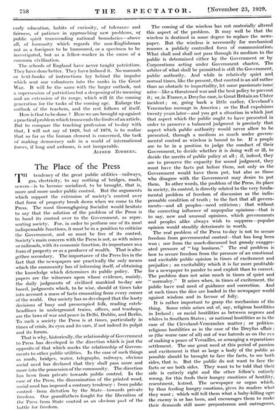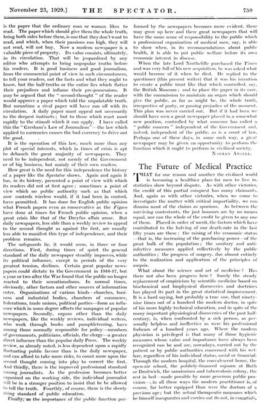The Place of the Press
1ni tendency of the great public utilities—railways, . gas, electricity, to say nothing of bridges, roads, sewers—is to become socialized, to be brought, that is, more and more under public control. But the arguments which support the extension of society's control over that form of property break down when we come to the Press. The most thoroughgoing Socialist would hesitate to say that the solution of the problem of the Press is to hand its control over to the Government, as repre- senting society. For, in order to perform one of its most indispensable functions, it must be in a position to criticize the Government, and so must be free of its control. Society's main concern with the Press is not, as with mines or railroads, with its economic function, its importance as a form of property or as a producer of wealth. That is alto- gether secondary. The importance of the Press lies in the fact that the newspapers are practically the only means which the community has of informing itself, of obtaining the knowledge which determines its public policy. The papers are the witnesses upon whose evidence, mainly, the daily judgments of civilized mankind to-day are based, judgments which, to be wise, should at times take into account a mass of facts emanating from every corner of the world. Our society has so developed that the hasty decisions of busy and preoccupied folk, reading catch- headlines in underground trains, offices, and tea.shops, are the laws of war and peace in Delhi, Dublin, and Berlin. To such a society the Press is at times, particularly in times of crisis, its eyes and its ears, if not indeed its pulpit and its forum.
That is why, historically, the relationship of Government to Press has developed in the direction which is just the opposite of that which marks the relationship of Govern- ments to other public utilities. In the case of such things as roads, bridges, water, telegraphs, railways, obvious social need has declared that they shall pass more and more into the possession of the community. The direction has been from private towards public control. In the case of the Press, the dissemination of the printed word, social need has imposed a contrary tendency : from public control—from dictation by the State—towards private freedom. Our grandfathers fought for the liberation of the Press from State control as an obvious part of the battle for freedom. The coming of the wireless has not materially altered this aspect of the problem. It may well be that the wireless is destined in some degree to replace the news- paper. But the wireless is necessarily for mechanical reasons a publicly controlled form of communication; What shall and shall not pass through its medium to the public is determined either by the Government or by Corporations acting under Government charter. The arbiter of what shall be permitted is still the Government, public authority. And while in relatively quiet and. normal times, like the present, that control is an aid rather than an obstacle to impartiality, let some passionate issue arise—like a threatened war and the best policy to prevent it; or, in France, a Dreyfus case, in Great Britain an Ulster incident ; or, going back a little earlier, Cleveland's Venezuelan message in America ; or the Red expulsions- twenty years later—and you get a situation in which just that aspect which the public ought to have presented in order to preserve a balanced judgment is precisely that aspect which public authority would never allow to be presented, through a medium as much under govern- mental control as wireless is bound to be. If a people are to be in a position to judge the conduct of their Government, to decide whether it is doing well or ill, to decide the merits of public policy at all ; if, indeed, they are to preserve the capacity for sound judgment, they must have the facts put before them, not only as the Government would have them put, but also as those who disagree with the Government may desire to put them. In other words, the problem of the Press, its place in society, its control, is directly related to the very funda. mental problem of freedom of discussion as the indis. pensable condition of truth ; to the fact that all govern. ments—and all peoples—need criticism ; that without the correcting influence of unpopular opinions—that is to say, new and unusual opinions, which governments and peoples alike always wish to suppress—popular opinion would steadily deteriorate in worth.
The real problem of the Press to-day is not to secure freedom from governmental control—that has long been won ; nor from the much-discussed but grossly exagger- ated pressure of " big business." The real problem is how to secure freedom from the pressure of an emotional and excitable public opinion in times of excitement and prejudice ; an excitability which it is far more profitable for a newspaper to pander to and exploit than to correct. The problem does not arise much in times of quiet and " normalcy." It arises when, in times of excitement, the public have real need of guidance and correction. And at such times the dice are loaded in the newspaper world against wisdom and in favour of folly.
It is rather important to grasp the mechanism of the thing. Some crisis arises out of, say, religious hostilities in Ireland ; or racial hostilities as between negroes and whites in Southern States ; or national hostilities as in the case of the Cleveland-Venezuelan matter ; or politico-.
religious hostilities as in the case of the Dreyfus affair ; or (the worse case of all) out of war hatreds as on the eve of making a peace of Versailles, or arranging a reparations settlement. The one great need at this period of passion and excitement is that as large a body of the public as possible should be brought to face the facts, to see both sides, that is. But the public do not want to face the facts or see both sides. They want to be told that their side is entirely right and the other fellow's entirely wrong, for this feeds their hungry emotions of hostility, resentment, hatred. The newspaper or organ which, by thus feeding hungry emotions, gives its readers what they want ; which will tell them what a baby-killing ogre the enemy is or has been, and encourages them to make their demands still more preposterous and outrageous, is the paper that the ordinary man or woman likes to read. The paper which should give them the whole truth; bring both sides before them, is one that they don't want to read, and which, when their passions run high, they will not read, will not buy. Now a modern newspaper is a valuable piece of property. - Its value consists, ultimately, in its circulation. That will be jeopardized by any editor who attempts to bring unpopular -truths before his readers. It is good business and good journalism, from the commercial point of view in such Circumstances, to tell your readers, not the facts and what they ought to know, but the half-truths or the entire lies which flatter their prejudices and inflame their pre-possessions. It may be argued that the " second-thought " of the reader would approve a paper which told the unpalatable truth. But meantime a rival paper will have run off with its circulation. A daily paper must appeal not necessarily to the deepest instincts ; but to those which react most rapidly to the stimuli which it can apply. I have called this the " Gresham's Law of Journalism "—the law which applied to currencies causes the bad currency to drive out the good.
It is the operation of this law, much more than any plot of special interests, which in times of crisis is apt to debauch the great majority of newspapers. They need to be independent, not merely of the Government or of big business, but mainly of their own readers.
How great is the need for this independence the history of a paper like the Spectator shows. Again and again it has, in its history, presented a point of view with which its readers did not at first agree ; sometimes a point of view which no public authority such as that which now controls wireless would, if it had been in control, have permitted. It has done for English public opinion what French papers even as conservative as the Figaro have done at times for French public opinion, when a great crisis like that of the Dreyfus affair arose. But daily newspapers, less able than a weekly review to appeal to the second thought as against the first, are usually less able to manifest this type of independence, and their problem remains.
The safeguards lie, it would seem, in three or four directions. First, during times of quiet the general standard of the daily newspaper steadily improves, while its political influence, except in periods of the very greatest tension, declines. Certain great popular news- papers could dictate to the Government in 1916-17, but a year or two after the War found that the public no longer reacted to their sensationalisms. In normal times, obviously, other factors and other sources of information enter. Organizations of various kinds—churches, busi- ness and industrial bodies, chambers of commerce, federations, trade unions, political parties—form an influ- ence which in some degree offsets the rampages of popular newspapers. Secondly, organs other than the daily newspapers, like the weekly reviews, individual writers, who work through books and pamphleteering, have among those normally responsible for policy—members of governments, politicians, officials, the clergy—a greater direct influence than the popular daily Press.. - The weekly review, as already noted, is less dependent upon a rapidly fluctuating public favour than is the daily newspaper, and can afford to take more risks, to count more upon the second thought coming into play to correct the first. And thirdly, there is the improved professional standard among journalists. As the profession becomes better organized on the working side, the individual journalist will be in a stronger position to insist that he be allowed to tell-the truth. -Fourthly, of course; there is the slowly rising -standard of -public education. - Firally;–res the-importance of the piablie function formed-by the newspapers becomes more evident, there may grow up here and there great newspapers that will have the same sense of responsibility to the -public which a professional organization of medical men, say, is able to show when, in its recommendations about public health, it is able to put public welfare before its own economic interest in disease.
When the late Lord Northcliffe purchased the Times and was very full of his new acquisition, he was asked what would become of it when he died. He replied to the questioner (this present writer) that it was his intention to create a public trust like that which controlled, say, the British Museum ; and to place the paper in its care. with the commission to maintain an organ which should give the public, as far as might be, the whole truth, irrespective of party, or passing prejudice of the moment. This plan was never carried out. But if it had been we should have seen a great newspaper placed in a somewhat new position, controlled by what someone has called a " public concern " independent of the Government and, indeed, independent of the public, as is a court of law. Perhaps one of these days, in some such way, a great newspaper may be given an opportunity to perform the function which it ought to perform in civilized society.
NORMAN ANGELL.































































 Previous page
Previous page